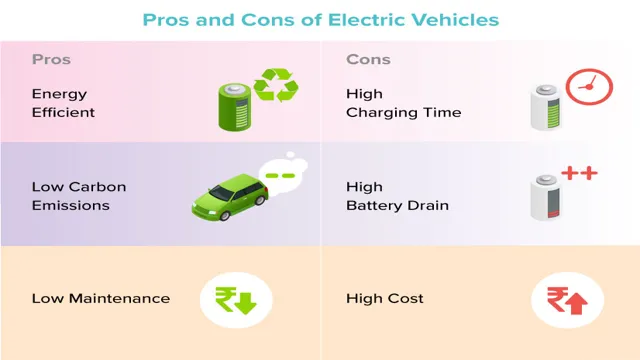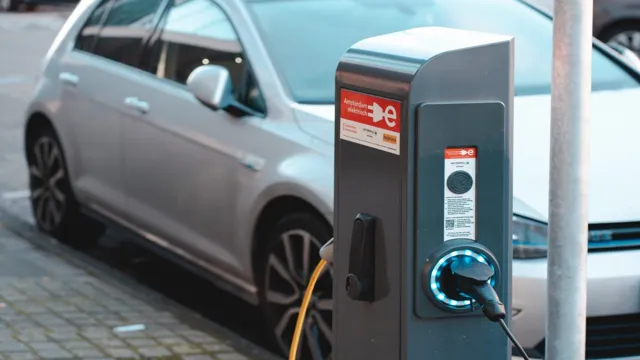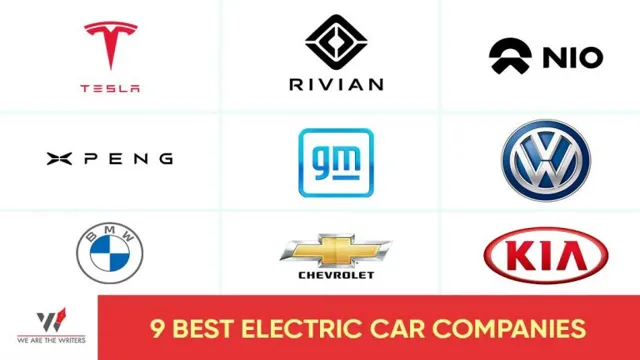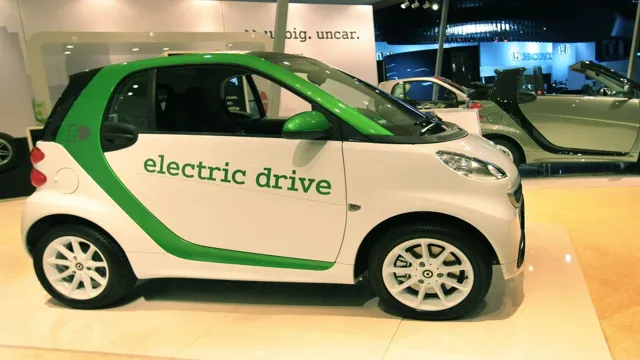5 Ways Electric Cars are Saving the Planet and Your Wallet: The Environmental Benefits You Need to Know
Are you curious to know about the environmental benefits of electric cars? As climate change continues to impact our planet, more and more people are turning to electric cars as a solution to reduce their carbon footprint. Not only are they able to help combat air pollution and reduce greenhouse gas emissions, but they also offer a range of other benefits that traditional gas-powered cars simply cannot match. In this blog post, we will delve deeper into the various ways in which electric cars are helping to create a more sustainable future for all.
From lower carbon emissions to increased energy efficiency, there are many reasons why electric cars are becoming the preferred choice for environmentally conscious drivers. So, let’s take a closer look at the benefits of electric cars and discover how they can help us build a cleaner, healthier, and more sustainable future.
Reduced Emissions
One of the most significant environmental benefits of electric cars is their ability to reduce emissions. Unlike traditional gasoline-powered vehicles that emit harmful pollutants, electric cars produce zero tailpipe emissions. When charged with renewable energy sources such as solar or wind power, they can be completely emissions-free.
Even when charged with electricity generated from coal or natural gas, electric cars produce fewer emissions than their gasoline counterparts. This means that electric vehicles can help improve air quality and reduce greenhouse gas emissions that contribute to climate change. Overall, the environmental benefits of electric cars make them a more sustainable and socially responsible mode of transportation.
Electric cars produce fewer greenhouse gases than gas-powered cars
Reduced Emissions Many people are concerned about the environmental impact of cars on our planet. Fortunately, electric cars are a great alternative to traditional gas vehicles, as they produce significantly fewer greenhouse gas emissions. In fact, electric cars produce zero emissions while driving, as they don’t require any gasoline or diesel fuel to power their engines.
Even when considering the emissions produced during the manufacturing and transportation of electric cars, they still come out ahead over the lifetime of the vehicle. This is because gas-powered cars emit pollutants into the air every time they’re driven, while electric cars do not. Additionally, as renewable energy sources like wind and solar become more widespread, the electricity used to charge electric cars will become even cleaner, further reducing their environmental impact.
With reduced emissions, electric cars are a great option for those looking to reduce their carbon footprint and help protect our planet for future generations.

Electric cars help improve air quality in cities
Electric cars are a great way to reduce emissions and improve air quality in cities. With traditional cars that run on gasoline or diesel, the engine burning the fuel creates toxic gases that contribute to air pollution. However, electric cars use electricity to power their engines, so they don’t emit harmful pollutants.
This means that electric cars can help reduce the amount of smog and other pollutants that are found in urban areas. Not only does this benefit the environment, but it also helps improve the health of people living in cities. With fewer pollutants in the air, people are less likely to suffer from respiratory issues and other health problems related to poor air quality.
So, it’s clear that electric cars are an excellent way to promote healthier and cleaner cities that are more environmentally sustainable. By choosing to drive an electric car, we can all do our part in reducing emissions and protecting the planet.
Reduced Energy Consumption
One of the major environmental benefits of electric cars is their reduced energy consumption. Unlike traditional gas-powered vehicles, electric cars run on electricity generated by rechargeable batteries. This means that they don’t require gasoline or diesel to operate, reducing harmful emissions and reducing our dependence on fossil fuels.
In fact, electric cars use up to 60% less energy than traditional cars, making them a much more eco-friendly option for commuters. Additionally, because electric cars can be recharged at home or at work, drivers don’t have to make trips to the gas station, which reduces carbon emissions and saves time. By choosing an electric car, you can do your part to reduce your carbon footprint and contribute to a healthier planet for future generations.
Electric cars use less energy than gas-powered cars
When it comes to energy consumption, electric cars are the clear winner over gas-powered cars. Because electric cars rely on rechargeable batteries for power, they use significantly less energy than their gas-powered counterparts that require constant refilling of gasoline. This not only reduces the amount of fossil fuels that are burned and released into the environment, but it also saves you money in the long run.
In fact, according to the United States Department of Energy, the average cost to operate an electric car is about half as much per mile as the cost to operate a gas-powered car. So not only are electric cars better for the environment, but they are also a more cost-effective choice for savvy drivers looking to save money on their daily commute. So, if you’re considering purchasing a car and want to reduce your energy consumption, an electric car is definitely worth considering.
Electric cars can be powered by renewable energy sources
One of the advantages of electric cars is that they can be powered by renewable energy sources, reducing our dependence on fossil fuels. Unlike traditional gas-powered cars, which rely completely on fossil fuels, electric vehicles can be charged using solar, wind, or hydroelectric power. This means that when you drive an electric car, you’re not only helping to reduce greenhouse gas emissions, but you’re also supporting the development of new renewable energy infrastructure.
Additionally, electric cars are more energy efficient than their gas-powered counterparts, which means they require less energy to travel the same distance. This translates to lower operating costs and a smaller carbon footprint. By embracing electric cars and renewable energy, we can take a step towards a cleaner and more sustainable future.
Electric cars minimize our reliance on non-renewable energy sources
Electric cars hold the potential to minimize our reliance on non-renewable energy sources, significantly reducing our overall energy consumption. These cars use batteries as a source of power, which can be charged using clean sources of electricity like solar or wind power. This reduction in energy consumption would not only lead to significant cost savings for individuals but would also benefit the environment by reducing greenhouse gas emissions.
Moreover, with advancements in technology, electric cars are becoming more efficient and able to travel longer distances on a single charge. As a result, the shift towards electric cars can help lead us towards a greener future, where our energy needs are met through sustainable sources. By embracing electric cars, we can significantly reduce our carbon footprint and pave the way for a cleaner, more sustainable world.
Reduced Noise Pollution
One of the biggest environmental benefits of electric cars is the significant reduction in noise pollution. Traditional gasoline-powered cars are notorious for creating loud and disruptive sounds, especially in densely populated areas. This noise can cause a range of negative impacts on both humans and the surrounding wildlife.
However, electric cars operate quietly due to their electric motors, which produce barely any sound. Not only does this create a more peaceful environment for everyone, but it also improves the health and well-being of those who live in urban areas. Furthermore, this reduction in noise pollution can have a positive impact on wildlife, as it can reduce the disturbance caused by traffic noise and lead to more peaceful and natural habitats for animals.
Overall, the reduction in noise pollution is just one of the many benefits associated with electric vehicles, making them a great investment for both the environment and community.
Electric cars are much quieter than gas-powered cars
Electric cars, noise pollution Have you ever been woken up in the middle of the night by a loud revving engine? Or maybe you’ve been walking down the street and had to shout over the sound of a passing car. These are all examples of noise pollution, an often-overlooked and yet significant environmental issue. Luckily, electric cars are making strides in reducing noise pollution.
Because they rely on electric motors rather than internal combustion engines, they produce much less noise while driving. Imagine a peaceful, quiet street with only the sounds of birds chirping and leaves rustling in the breeze. That’s what electric vehicles can offer us.
Not only do they reduce noise pollution, but they also provide a more relaxing and less stressful driving experience. Say goodbye to earbuds and hello to the sound of silence on your next drive with an electric car.
Electric cars can reduce noise pollution in urban areas
Electric cars can have a significant impact on reducing noise pollution in urban areas. For those who live in bustling cities, the constant noise of traffic can become overwhelming and stressful. Electric cars, on the other hand, emit significantly less noise as they use electric motors instead of traditional combustion engines.
This reduction in noise pollution can lead to a more peaceful and tranquil environment, especially in densely populated areas. Moreover, electric cars produce much less vibration and noise pollution on roads, which can have positive health effects on people who live close to busy roads. So, if you’re looking to make your city a quieter and healthier place to live, investing in electric cars can be a great step towards that goal.
Summary
Electric cars are becoming increasingly popular, and for good reason. One of the most significant benefits of electric cars is their positive impact on the environment. Electric cars produce far fewer emissions than traditional gasoline-powered vehicles, which is a massive plus for the planet.
By driving an electric car, you’re effectively cutting down on harmful pollutants like carbon monoxide and greenhouse gases, which can contribute to global warming. Additionally, electric cars don’t require oil changes, reducing the number of fossil fuels consumed and lowering dependency on them. With electric cars, we can minimize our carbon footprint without sacrificing the convenience of personal transportation.
As more people make the switch to electric vehicles, we can all enjoy a cleaner, healthier planet.
Conclusion
If you’re looking to reduce your carbon footprint and do your part in protecting the environment, switching to an electric car is the way to go! Not only do electric cars emit far less greenhouse gas emissions than their gasoline-powered counterparts, but they’re also more energy-efficient and help to reduce our dependence on fossil fuels. So go ahead, make the switch and drive towards a greener future!”
FAQs
How do electric cars benefit the environment?
Electric cars benefit the environment by producing less harmful emissions compared to traditional gasoline cars. They emit no carbon dioxide, particulate matter, or volatile organic compounds, which help reduce air pollution and its impact on climate change.
What impact do electric cars have on air quality?
Electric cars help reduce air pollution and improve air quality by emitting fewer pollutants. By choosing electric cars over gas cars, we can drastically reduce harmful emissions and improve the overall health of our environment.
How do electric cars compare to gas cars in terms of energy efficiency?
Electric cars are much more energy-efficient than gas cars. They convert around 60% of the electrical energy from the grid to power at the wheels, while gas cars only convert around 20% of the energy stored in gasoline to power.
Are there any incentives for driving an electric car?
Yes, many countries offer incentives for buying and driving electric cars, such as tax credits, rebates, and other financial benefits. Additionally, some cities allow electric car drivers to use carpool lanes or offer free parking. These incentives help promote the adoption of electric cars and make them more accessible to consumers.



